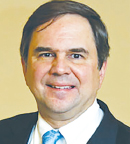
“This study is potentially practice-changing, with a doubling in objective response rate.”— Daniel P. Petrylak, MD
Tweet this quote
RAMUCIRUMAB (CYRAMZA) added to docetaxel improved progression-free survival and almost doubled the overall response rate compared with docetaxel alone in patients with advanced or metastatic urothelial cancer that has progressed on platinum-based chemotherapy. These results of the phase III RANGE trial were presented at a Presidential Symposium during the European Society for Medical Oncology (ESMO) 2017 Congress1 and published in The Lancet to coincide with the presentation.2
RANGE is the first phase III trial to show a progression-free survival advantage compared with chemotherapy alone in this setting. Checkpoint inhibitors are approved as first-line therapy and as second-line therapy after platinum-based therapy failure, but only 20% to 25% of patients respond. Therefore, new approaches are sorely needed.
Compared with docetaxel plus placebo, ramucirumab, a vascular endothelial growth factor receptor 2 inhibitor, plus docetaxel “reduced the risk of disease progression by 24%, and this was consistent across patient subgroups,” said lead investigator Daniel P. Petrylak, MD, Professor of Medicine and Urology at Yale University School of Medicine and Yale Cancer Center, New Haven, Connecticut. However, the absolute improvement in progression-free survival averaged about 1.5 months, depending on whether progression-free survival was investigator-assessed or assessed by blinded central review. Overall survival data are not yet mature and are needed before determining the true benefit of this approach.
Results in Perspective
Nevertheless, Dr. Petrylak stated that in his view, the results are “clinically meaningful.” In an interview with The ASCO Post, he commented, “This study is potentially practice-changing, with a doubling in objective response rate. There are currently no other options for patients after checkpoint inhibitors and other therapies fail.”
He summarized: “Ramucirumab plus docetaxel is a new treatment option that could become a standard of care in patients with platinum-refractory advanced or metastatic urothelial cancer who either have disease progression on checkpoint inhibitors or are not eligible to receive them,” Dr. Petrylak said.
ESMO expert Richard Cathomas, MD, Deputy Chief Physician of Oncology and Haematology, Kantonsspital Graubunden, Chur, Switzerland, was more cautious. In an ESMO press release, Dr. Cathomas stated: “This is the first trial to show an improvement in progression-free survival compared with chemotherapy alone in platinum-refractory urothelial cancer. However, the magnitude of benefit was 1.3 months, and, while statistically significant, it raises the question of whether this is clinically relevant.”
Dr. Cathomas noted that the overall survival data will determine the benefit of this approach. “Other trials that combined chemotherapy and angiogenesis in other cancers have shown that such a small progression-free survival benefit often does not translate into overall survival.”
Study Details
BASED ON POSITIVE PHASE II DATA showing that ramucirumab plus docetaxel almost doubled progression-free survival,3 the phase III RANGE trial was initiated in 530 patients with progressive advanced or metastatic urothelial cancer within 14 months of receiving platinum-based chemotherapy. Patients previously treated with one checkpoint inhibitor were included (7% in the ramucirumab/docetaxel arm and 10% in the placebo/docetaxel arm).

“Other trials that combined chemotherapy and angiogenesis have shown that such a small progression-free survival benefit often does not translate into overall survival.”— Richard Cathomas, MD
Tweet this quote
At baseline, demographic and disease characteristics were similar in the two treatment arms. More than 90% of patients had at least one Bellmunt risk factor (ie, liver metastases, hemoglobin < 10 g/dL, Eastern Cooperative Oncology Group performance status score > 0, and time since completion or discontinuation of therapy < 3 months).
Patients were randomized in a 1:1 ratio to receive ramucirumab at 10 mg/kg plus docetaxel at 75 mg/m2 or placebo plus docetaxel at the same dose. Patients were followed for a median of 5 months.
For the primary endpoint of investigator-assessed progression-free survival, median progression-free survival was 4.07 months with ramucirumab plus docetaxel vs 2.76 months with placebo plus docetaxel (hazard ratio [HR] = 0.75, P = .0118), representing a 25% reduction in disease progression favoring the experimental arm. A blinded central review showed a slightly more favorable progression-free survival hazard ratio, with medians of 4.04 months vs 2.46 months, respectively (HR = 0.672, P = .0005). The 12-month disease-free survival rate was 8.5% for the ramucirumab/docetaxel arm vs 5.1% for docetaxel alone.
The investigator-assessed objective response rate was 24.5% for the ramucirumab-containing arm vs 14% in the comparator arm. Complete response rates were 4.2% and 1.4%, respectively.
Toxicities were similar between the two treatment arms. Slightly less grade 3 anemia was seen on the ramucirumab-containing arm vs docetaxel alone (3% vs 11%, respectively). The most common grade 3 or higher adverse event was neutropenia (15% and 14%, respectively). Treatment discontinuations (209 on ramucirumab/docetaxel and 229 on placebo/docetaxel) were primarily due to disease progression.
Quality of life did not deteriorate in either arm, according to two validated instruments: the European Organisation for Research and Treatment of Cancer QLQ-C30 and EQ-5D-5L index scores.
DISCLOSURE: Dr. Petrylak has received consultant fees from Bayer, Bellicum, Dendreon, Exelixis, Ferring, Johnson and Johnson, Medivation, Millineum, Pfizer, Roche Laboratories, Sanofi Aventis (Tyme pharmaceuticals discontinued 1/31/17); grant support from Agensys, AstraZeneca, Bayer, Dendreon, Eli Lilly, Endocyte, Genentech, Innocrin, Johnson and Johnson, MedImmune, Medivation,Merck, Millineum, Novartis,Oncogenex, Pfizer, Progenics, Roche Laboratories, Sanofi Aventis, Sotio; has ownership interest/investment in Bellicum, Tyme; and has given expert testimony for Celgene and Sanofi. Dr. Cathomas reported no conflicts of interest.
REFERENCES
1. Petrylak D, Chi K, Drakaki A, et al: RANGE: A randomized, double-blind, placebo-controlled phase 3 trial of docetaxel with or without ramucirumab in platinum-refractory advanced or metastatic urothelial carcinoma. ESMO 2017 Congress. Abstract LBA4_PR. Presented September 10, 2017.
2. Petrylak DP, de Wit R, Chi KN, et al: Ramucirumab plus docetaxel versus placebo plus docetaxel in patients with locally advanced or metastatic urothelial carcinoma after platinum-based therapy (RANGE). Lancet. September 12, 2017 (early release online).
3. Petrylak DP, Tagawa ST, Kohli M, et al: Docetaxel as monotherapy or combined with ramucirumab or icrucumab in second-line treatment for locally advanced or metastatic urothelial carcinoma: An open-label, three-arm, randomized controlled phase II trial. J Clin Oncol 34:1500-1509, 2016.


